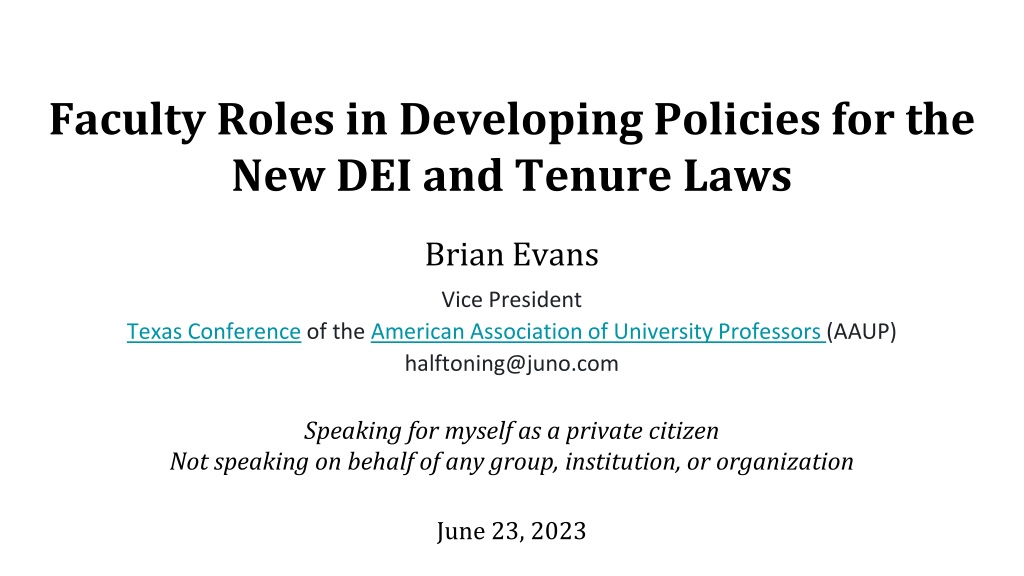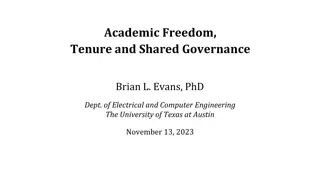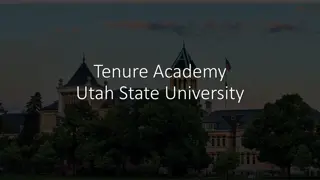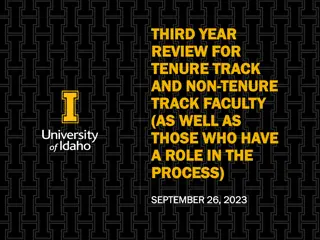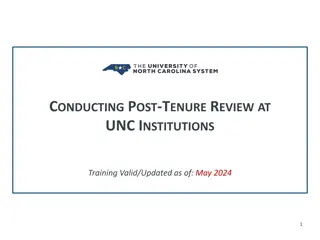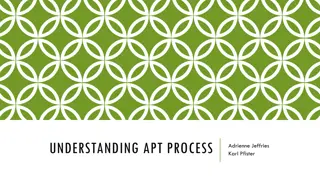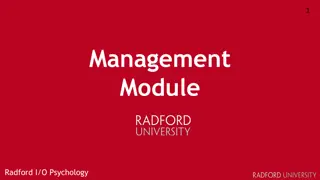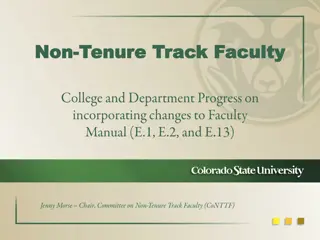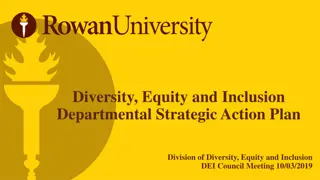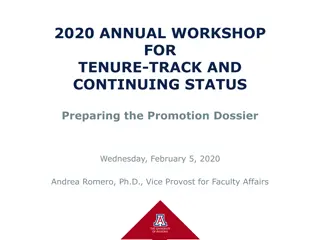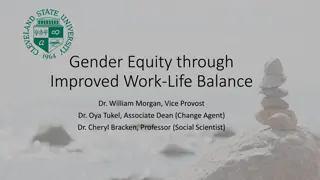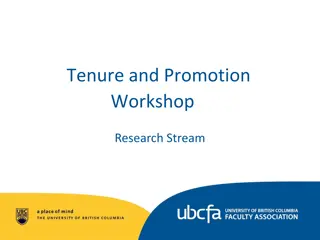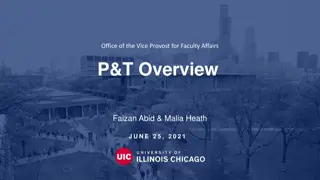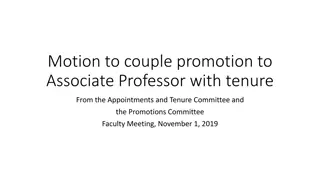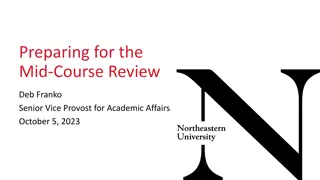Faculty Roles in Developing Policies for DEI and Tenure Laws
Texas legislation passed SB 17 and SB 18 impacting faculty tenure. The bills restrict hiring of tenured faculty after 2024, emphasizing academic freedom and post-tenure review. Faculty involvement in policy development is crucial to address potential consequences. The evolving tenure laws aim to shape the academic landscape significantly.
Download Presentation

Please find below an Image/Link to download the presentation.
The content on the website is provided AS IS for your information and personal use only. It may not be sold, licensed, or shared on other websites without obtaining consent from the author. Download presentation by click this link. If you encounter any issues during the download, it is possible that the publisher has removed the file from their server.
E N D
Presentation Transcript
Faculty Roles in Developing Policies for the New DEI and Tenure Laws Brian Evans Vice President Texas Conference of the American Association of University Professors (AAUP) halftoning@juno.com Speaking for myself as a private citizen Not speaking on behalf of any group, institution, or organization June 23, 2023
Texas Legislature Timeline Jan. 10, 2023, Regular Session started (140 Days) Mar. 6-10, 2023, Senate versions of DEI bill (SB 17) and tenure bill (SB 18) public May 8, 2023, House versions of SB 17 and SB 18 made public May 29, 2023, Regular Session ended May 29, 2023, First Special Session started (each is limited to 30 days) June 14, 2023, Gov. Greg Abbott signed SB 17 and SB 18 into law Senate Bills 1-30 high priority by Lt. Gov. Dan Patrick (fast tracked) Senate and House budgets ban funding for diversity, equity and inclusion (DEI) programs Senate budget has about $700M in additional funding for public higher education if SB 17 and 18 were to become law (budgets are for two years) 2
Initial Tenure Bill Passed by Senate April 6th SB18 Prohibits hiring of tenured & tenure-track faculty after Jan. 1, 2024 Allows faculty tenured before Jan. 1, 2024, to remain tenured Not the version passed by the Legislature Tenure Earned after a rigorous review of six years of teaching, research and service Protects academic freedom to foster critical thinking & intellectual exploration Allows professors to take on long-term curriculum development, research projects, and leadership positions vital to student experience and success Potential impacts of the Senate version of SB 18 Tenure-track faculty will seek tenure-track and tenured positions elsewhere Due to the starvation of the tenure pipeline, tenured faculty members will leave Loss of quality, prestige and rankings by Texas public colleges and universities 3
Different Tenure Bill Passed by House & Now Law SB18 modified Texas Education Code on Post-Tenure Review Part 1 Adds Tenure Definition Codifies tenure as continuous employment Sec. 2 Part 4 Only a governing board may grant tenure Sec. 3(b) Supreme Court held tenure as a property right property amount in Sec. 3(c) ** Part 2 - Tenure and Post-Tenure Review Policies in Sec. 3(c-1) Each governing board shall adopt policies and procedures regarding tenure Defines 10 ways to dismiss a tenured faculty member Continues provisions for periodic post-tenure review processes Underline means added to the law Part 3 Minimum Due Process Procedures in Sec. 3(c-4) ** 14th Amendment of the US Constitution: Government cannot deprive an individual of property or liberty without due process, but each State defines the property interest. 4
Faculty Role in SB 18 Policies & Procedures (1/2) the governing board shall seek advice and comment from the institution's faculty before adopting any policies and procedures under this section. The advice and comment from the faculty on the performance evaluation of tenured faculty shall be given the utmost consideration by the governing board. [SB 18, Sec. 3(c-2)] Academic Freedom is not mentioned in SB 18 Connect academic freedom as a necessary safeguard of academic freedom Academic freedom: freedom from censorship by the institution or government Other academic freedom safeguards include due process and shared governance Define reasons for termination that are undefined in SB 18 including professional incompetence unprofessional conduct that adversely affects the institution moral turpitude violated university system or institution policies Precise definitions reduce chance administrators could use them to try to fire faculty they don t like
Faculty Role in SB 18 Policies & Procedures (2/2) Additional grounds for termination in Sec. 3(c-1) include Failure to complete a development plan from post-tenure review other good cause as defined in the institution s policies Add layers to minimum due process procedures in Sec. 3(c-4) such as Allow faculty to examine evidence against them and talk to witnesses Allow faculty to have hearing by a faculty committee ( jury of peers ) Allow faculty to have the option for legal representation Allow faculty to complete grievance process prior to termination Model policy for due process: Statement on Procedural Standards in Faculty Dismissal Proceedings jointly formulated by AAC&U representing college/university administrations and AAUP representing faculty 6
Gold Standard for Tenure Policies Statement of Principles on Academic Freedom & Tenure, jointly formulated by American Association of Colleges & Universities (AAC&U) representing college and university administrations and American Association of University Professors (AAUP) representing professors. AAC&U has more than 800 college/university members. Statement on Procedural Standards in Faculty Dismissal Proceedings, jointly formulated by the AAC&U and AAUP. Statement on Government of Colleges and Universities, jointly formulated by the AAUP, American Council on Education, and Association of Governing Boards of Universities & Colleges. The AAUP represents faculty members, ACE represents university administrations, and AGB represents University Systems, Boards of Regents and Boards of Trustees. ACE has more than 1500 college and university members and AGB has more than 1300 college, university, and system members. 7
Banning DEI Programs and Practices (1/3) SB17 modifies Texas Education Code Chapter 51 Subchapter G on Responsibilities of governing boards, system administrations, and institutions Defines a diversity, equity, and inclusion (DEI) office per Sec. 1(a) Influencing hiring or employment practices w/r to race, color, ethnicity or sex Promoting differential treatment to individuals on basis of race, color, or ethnicity Promoting policies or procedures w/r to race, color, or ethnicity Conducting trainings, programs, or other activities designed or implemented in reference to race, color, ethnicity, gender identity, or sexual orientation Bans per Sec. 1(b) DEI offices, officers, programs, practices, and trainings Requirement of, or providing preferential treatment for, a DEI statement Preference on basis of race, sex, color, ethnicity, or national origin to an applicant for employment, an employee, or a participant in any function of institution An employee or third party from performing the duties of a DEI office 8
Banning DEI Programs and Practices (2/3) Exceptions to ban Sec 1(d) Academic course instruction Scholarly research or a creative work Student organizations Guest speakers Enhance student academic achievement or postgraduate outcomes that is designed and implemented without regard to race, sex, color, or ethnicity Data Collection Student recruitment or admissions When applying for grants or complying with terms for accreditation Can submit a statement highlighting the institution s work in supporting first- generation, low-income, and underserved student populations in Sec 1(c) 9
Banning DEI Programs and Practices (3/3) Penalties for faculty, staff, and contractors per Sec 1(b)(2) Policies and procedures developed by each Governing Board Discipline is up to and including termination for any employee or contractor who engages in conduct banned on the previous slide Institutional compliance and penalties Institution may not spend State funds each year until Governing Board certifies compliance per Sec. 1(e) If a state auditor finds an institution out of compliance, and the institution does not get into compliance, the institution loses formula funding increases, institutional enhancements, or exceptional items in the next biennium per Sec. 1(h) Student or employee may sue if required to participate in DEI training per Sec. 1(i) 10
Lots of Questions (1/4) The bill regulates all interactions at a public university or community college and employees face termination if they violate the ban on DEI programs and policies, the latter which are vaguely defined. Given the penalties, faculty and staff will self-censor in their interactions with students to avoid any perception that they might be violating some aspect of the bill. Where s the line not to cross? How do the 76 public Hispanic Serving Institutions (HSIs) and 2 public Historically Black Colleges and Universities serve their diverse populations? Impact on Title V federal grants for HSIs? How will the State reach its workforce development goals? All demographics must be reached. Of 4M people added to Texas population 2010-2020, 95% are people of color Excelenciain Education, A Texas Briefing of 25 Years of HSIs , 2021. 74 public Hispanic Serving Institutions (HSIs) are in Texas. UT Austin and Texas A&M became HSIs after the report issued. Alexa Ura, Jason Kao, Carla Astudilloand Chris Essig, People of color make up 95% of Texas population growth, and cities and suburbs are booming, 2020 census shows , Texas Tribune, Aug. 12, 2021. 11
Lots of Questions (2/4) Research expenditures at Texas public universities and health-related institutions reached $5.44 billion in FY 2020. Of the $5.44B/year, $3B/year is from federal sources and $1B/year from private sources. Increasingly, grant opportunities from the major federal granting agencies in the US require DEI programs and infrastructure. The goal is to keep America s technological and engineering advantage by including every talented person in the STEM workforce. These efforts include all major agencies supporting research in STEM (including the National Science Foundation, National Institutes of Health, Department of Energy, and Department of Defense) and other fields, requiring evidence that grant monies will be used in both innovative research and workforce development and diversification, including DEI. Brian Evans, Andrea Gore, Brian Korgel, Diana Marculescu, and Angela Valenzuela, How Senate Bill 17 and Banning DEI Jeopardizes University Research Funding: A STEM Perspective , April 15, 2023. Texas AAUP, Professor Association Responds to the Passage of Anti-DEI and Anti-Tenure Bills by the Texas House Higher Education Committee , May 13, 2023 12
Lots of Questions (3/4) Example: For all grants starting FY 2023, the Dept. of Energy Office of Science ($8B in annual budget) will require applicants to submit a Promoting Inclusive and Equitable Research (PIER) Plan as an appendix to their proposal narrative. PIER Plans should describe the activities and strategies applicants will incorporate to promote diversity, equity, inclusion, and accessibility in their research projects. PIER Plans will be evaluated as part of the merit review process and will be used to inform funding decisions. Brian Evans, Andrea Gore, Brian Korgel, Diana Marculescu, and Angela Valenzuela, How Senate Bill 17 and Banning DEI Jeopardizes University Research Funding: A STEM Perspective , April 15, 2023. 13
Lots of Questions (4/4) What provisions under SB 17 will support infrastructure that will satisfy the workforce development requirements of federal and private grant funding agencies. What s the impact on applying and being competitive for grants that require DEI with respect to race, color, ethnicity or sex? $1.5B/year in grants at risk. STEM grants from NSF, NIH, and DoE. Title IV federal grants for international area studies and world languages programs also at risk. Brian Evans, Andrea Gore, Brian Korgel, Diana Marculescu, and Angela Valenzuela, How Senate Bill 17 and Banning DEI Jeopardizes University Research Funding: A STEM Perspective , April 15, 2023. Texas AAUP, Professor Association Responds to the Passage of Anti-DEI and Anti-Tenure Bills by the Texas House Higher Education Committee , May 13, 2023 14
Texas AAUP Statements on SB 17 Texas AAUP Press Release on Passage of SB 17, May 28, 2023 Texas AAUP SB 17 Summary and Analysis Brian Evans, Andrea Gore, Brian Korgel, Diana Marculescu, and Angela Valenzuela, How Senate Bill 17 and Banning Diversity, Equity and Inclusion (DEI) Jeopardizes University Research Funding: A STEM Perspective , Apr. 15, 2023 Op-Ed: Karma Chavez, Opinion: Equity, inclusion, and access don t divide us. They bring us together , Austin American-Statesman, April 16, 2023. Op-Ed: Christine Julien, DEI: What it is and why it matters in engineering , Dallas Morning News, April 1, 2023. 15
Texas AAUP Statements on SB 18 Texas AAUP Press Release on Passage of SB 18, May 27, 2023 Texas AAUP SB 18 Summary and Analysis Texas AAUP, How the National Tenure System is Critical to Being Competitive for Federal Research Grants to Public Universities in Texas: A STEM Perspective , May 22, 2023. Brian Evans, Tenured and Tenure-Track Faculty in the US, Texas A&M & UT Austin , April 3, 2023. Related "Governor Abbott Congratulates Texas Universities on Earning Prestigious National Research Rankings", Feb. 16, 2022. 16
